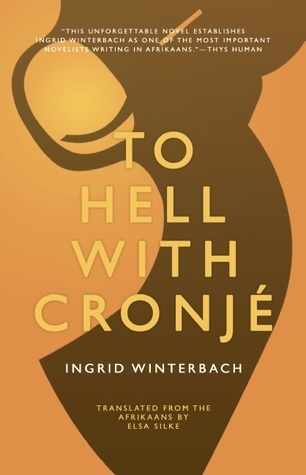What do you think?
Rate this book


234 pages, Paperback
First published January 1, 2002
“My friends,” he says, “the war has never been as close to being over as it is at this moment. No more than two months. End of May, beginning of July it will all be over.”Set in the final months of the second Boer War, To Hell With Cronjé follows a group of Boer soldiers as they attempt to accompany a shell-shocked fellow soldier home to his mother, as he is no longer fit to fight. They are waylaid in a camp under suspicion of desertion or treason early in the book, and most of the novel takes place there.
Ben nods. Reitz’s mouth is dry.
“The War is nearly over,” says Oompie--his eyes glazed over, his voice hardly recognisable, “but it’s not the end of the struggle by far. The struggle will not be over in your lifetime, nor in your children’s lifetime, nor in the lifetime of your children’s children.”
“Has the struggle been in vain then?” asks Ben. His voice is gruff.
Suddenly Oompie sits up straight. His ear no longer held to the jar.
“Yes,” he says in his normal voice, “the struggle has been in vain.”
The origins of the Boer War lay in Britain's desire to unite the British South African territories of Cape Colony and Natal with the Boer republics of the Orange Free State and the South African Republic (also known as the Transvaal). The Boers, Afrikaans-speaking farmers, wanted to maintain their independence.
 Map of Southern Africa, c1899, source: British National Army Museum
Map of Southern Africa, c1899, source: British National Army MuseumOn the outbreak of war, the British made a tacit agreement with their Boer enemies that both sides would not arm the black population. As the war progressed, however, this stance proved difficult to maintain and they began employing armed blacks as scouts.
It is estimated that between 15,000 and 30,000 black Africans eventually served under arms with the British Army as scouts and sentries. Another 100,000 worked as labourers, transport drivers, blacksmiths, wheelwrights, farriers and builders. (National Army Museum, scroll down to the heading, 'African and Indian role')
At noon, their shadows hard upon their heels, they come across three black men on horseback. The men are wearing hats and blankets. One is clad in the threadbare tunic of a Khaki [i.e. British] uniform. Another wears a feather in his hat.
'A motley crew,' Ben mutters.
The two groups come to a halt, facing each other.
'What do you want?' Willem demands. 'I trust you're not helping the Khakis.'
The men confer in Xhosa. The leader raises his hand in what appears to be a peace sign.
He and Willem bow formally.
The group passes them without further greeting.
'Tonight they're be joining General Pettingale,' Ben says.
'At least they're unarmed,' Willem says, 'and rightly so.' (p.7)